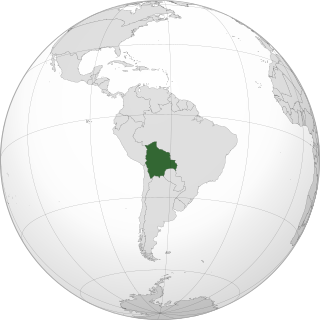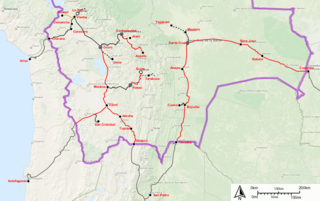Transport in Bolivia is mostly by road. The railways were historically important in Bolivia, but now play a relatively small part in the country's transport system. Because of the country's geography, aviation is also important.

The Bolivia national football team, nicknamed La Verde, has represented Bolivia in men's international football since 1926. Organized by the Bolivian Football Federation (FBF), it is one of the ten members of FIFA's South American Football Confederation (CONMEBOL).

The 1997 Copa America was the 38th edition of the Copa America. It was held in Bolivia from 11 to 29 June. It was organized by CONMEBOL, South America's football governing body.
Listed below are the dates and results for the 2002 FIFA World Cup qualification rounds for the South American zone (CONMEBOL). For an overview of the qualification rounds, see the article 2002 FIFA World Cup qualification.

Estadio Hernando Siles is a multi-purpose stadium in La Paz, Bolivia. It is the country's largest stadium, with a capacity of 41,143 seats. It is named after Hernando Siles Reyes, the 31st President of Bolivia (1926–1930). Its biggest attendance was in 1989 during the match between The Strongest and Destroyers, with 52494 fans in attendance.
Listed below are the dates and results for the 1982 FIFA World Cup qualification rounds for the South American zone (CONMEBOL). For an overview of the qualification rounds, see the article 1982 FIFA World Cup qualification.

The División de Fútbol Profesional is the top-flight professional football league in Bolivia. In 2017 it replaced the "Liga de Fútbol Profesional Boliviano".
The I Southern Cross Games were a multi-sport event held from November 3 to November 12, 1978, in La Paz, Bolivia, with some events in Cochabamba and Santa Cruz de la Sierra.
The South American zone of 2010 FIFA World Cup qualification saw ten teams competing for places in the finals in South Africa. The format is identical to that used for the previous three World Cup qualification tournaments held by CONMEBOL. Matches were scheduled so that there were always two games within a week, which was aimed at minimizing player travel time, particularly for players who were based in Europe.
The 2009South American Youth Championship was a football competition for national teams U-20 who are associated with the football federation CONMEBOL. It was the 24th time the tournament was held and took place in Venezuela from 19 January to 8 February. It also served as qualification for the 2009 FIFA U-20 World Cup. Brazil won the tournament, becoming champions for the tenth time.
Rugby union in Bolivia is a minor, but growing sport.
The South American Zone of 2014 FIFA World Cup qualification saw nine teams competing for 4 or 5 berths in the finals. Brazil automatically qualified for the World Cup as the host nation so were not involved in CONMEBOL qualifying. Argentina, Colombia, Chile, Ecuador and Uruguay advanced to the World Cup.
The Copa Aerosur & del Sur 2010 was the eighth edition of the summer soccer tournament sponsored by Aerosur. It involved six teams from the core cities in Bolivia: Bolivar and The Strongest of La Paz, Cochabamba Aurora and Wilstermann, Blooming and Oriente Petrolero of Santa Cruz, and six teams from 2009 Copa Simón Bolívar.
The 2010 season is Bolivar's 33rd consecutive season in the Liga de Fútbol Profesional Boliviano, and 85th year in existence as a football club. To see more news about Bolivar see Bolivar Official Website

The history of the Jews in Bolivia goes back to the colonial period of Bolivia in the 16th century. In the 19th century, Jewish merchants came to Bolivia, most of them taking local women as wives and founding families that merged into the mainstream Catholic society. This was often the case in the eastern regions of Santa Cruz, Tarija, Beni and Pando, where these merchants came either from Brazil or Argentina.
The South American Youth Championship 1983 was held in Cochabamba, La Paz and Santa Cruz, Bolivia. It also served as qualification for the 1983 FIFA World Youth Championship.
The South American Youth Championship 1997 was held in Coquimbo, Iquique and La Serena, Chile. It also served as qualification for the 1997 FIFA World Youth Championship.

The 2013 South American U-15 Championship was the 6th edition of the South American U-15 Championship, the biennial international youth football championship organised by CONMEBOL for the men's under-15 national teams of South America. It was held in Bolivia from 16 to 30 November 2023.

The history of rail transport in Bolivia began in the 1870s after almost three decades of failed efforts to build railroads to integrate the country, mining was the driving force for the construction of railways. The need to transport saltpeter to the coast triggered the first railway lines in Bolivia. It was the silver mining, however, that drove the construction of a railway from the Pacific coast to the high plateau during the nineteenth century. Later, at the beginning of the twentieth century, tin mining gave a new impetus to railway building, forming what is now known as the Andean or Western network. The eastern network, on the other hand, developed between the years 1940 and 1960 and is financed in exchange for oil through agreements with Argentina and Brazil. Bolivia being a landlocked country, the railways played a fundamental role and the history of its railroads is the history of the country's efforts to reach first ports on the Pacific coast and then the Atlantic.

The Copa América is South America's major tournament in senior men's football and determines the continental champion. Until 1967, the tournament was known as South American Championship. It is the oldest continental championship in the world with its first edition held in 1916.







